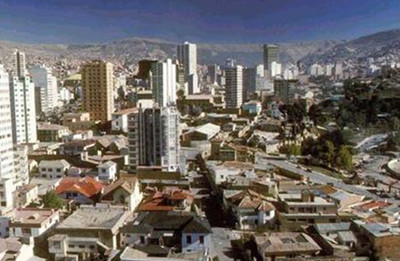貝略
The travails of ALBA
玻利維亞替代計劃隱隱作痛
The more successful of Latin America's populists have become more pragmatic
拉美民粹者身居上游,更為腳踏實地
ON THE night of October 12th, after comfortably winning a third term as the president of Bolivia, Evo Morales was in full rhetorical flow. Having dedicated his victory to Cuba's Fidel Castro and the late Hugo Chavez of Venezuela, he went on: “How much longer will we continue to be subjected to the North American empire or the capitalist system? This triumph is a triumph for anti-imperialists and anti-colonialists.”
10月12日晚玻利維亞總統(tǒng)連任三屆的勝利手到擒來后,埃沃·莫拉萊斯大放厥詞,他將他的光榮歸功于古巴的卡斯特羅及委內(nèi)瑞拉上屆總統(tǒng)查韋斯,他稱,我們受北美帝國和資本主義制度的束縛之日還有多久,我們的勝利是反帝國主義和殖民化的勝利。

So far, so reminiscent of 2007. That was when Chavez's anti-yanqui continental alliance, known as the Bolivarian Alternative for the Americas (ALBA), hit its zenith. It had gained two new recruits with the election of Rafael Correa in Ecuador and of Daniel Ortega in Nicaragua. Having won a new term by a 26-point margin, Chavez pledged himself to “21st-century socialism”. A year earlier Mr Morales, a socialist coca-growers' leader of Amerindian descent, had won Bolivia's presidency proclaiming that he was “the United States's worst nightmare”. In Argentina the election in 2007 of Cristina Fernandez, an ALBA fellow-traveller, prolonged the regime of her husband and predecessor, Nestor Kirchner.
回想2007年,當(dāng)時正值查韋斯的反美聯(lián)盟美洲玻利維亞替代計劃熱火朝天,拉斐爾和丹尼爾在尼加拉瓜成功當(dāng)選后,他們便又多了兩名戰(zhàn)友,查韋斯以領(lǐng)先26個百分點的成績開啟新的任期,他宣稱要音量21世紀(jì)的社會主義,就在一年前,美洲印第安人莫拉萊斯以社會主義者,古柯種植領(lǐng)袖的身份當(dāng)選玻利瓦爾的總統(tǒng),稱它將是美國最恐怖的噩夢,2007年在阿根廷,美洲玻利維亞計劃成員克里斯蒂娜的成功當(dāng)選延續(xù)了她丈夫薩洛德的政權(quán)。
Analysts lumped these leaders together as radical populists, for want of a better term. Yet despite a shared bent for autocracy, there were always differences among them, not least because of their countries' differing circumstances. Seven years on, their fates are distinct. In Venezuela Chavez bequeathed a toxic economic legacy to his lacklustre successor, Nicolas Maduro. A country that claims the world's biggest oil reserves has been so badly mismanaged that it is scraping around for dollars. As for Ms Fernandez, having plunged Argentina into stagflation, she is down and almost out, despite her last-gasp effort to turn her argument over debt with a New York court into a nationalist epic.
分析者將這些領(lǐng)導(dǎo)人歸結(jié)為激進(jìn)的民粹主義者,期望實現(xiàn)更好的領(lǐng)導(dǎo),即使他們都推行專制,但之間也有所不同,其中的原因也不僅僅在于不同國家的具體國情,7年之后,他們的命運也有所不同,在委內(nèi)瑞拉,查韋斯將有毒經(jīng)濟(jì)財富的爛攤子丟給老氣橫秋的繼任者,這個國家聲稱賦予世界上最大的石油儲備,國內(nèi)的管理卻混亂不堪,落得到處借錢的下場,克里斯蒂娜將該國推入了滯脹的深淵,雖然她竭力在紐約法庭的爭論中贏得主動,盡展民族主義氣節(jié),卻仍不得不下臺,差點退出政壇。
Their difficulties are in sharp contrast with Mr Morales's continuing popularity. True, he has been in power for a shorter period. But his success has recently owed less to “anti-capitalism” and much more to his accommodation with economic orthodoxy and local capitalists. After a turbulent early period when he pushed through a new constitution, quashed the opposition and nationalised foreign-owned oil and gas producers and utilities, he has presided over several years of political stability and economic growth. And he has made his peace with private business.
這張窘境與莫拉萊斯的扶搖直上形成了鮮明的對比,不錯,他當(dāng)政的時間確實是短,但他的成功很大程度上是得益于他迎合經(jīng)濟(jì)正統(tǒng)學(xué)說和本地資本家的口味,受反資本主義的之風(fēng)影響較小,在經(jīng)過了他早先推出新憲法時的動蕩之后,他橫掃反對者,將外國所有的石油天然氣生產(chǎn)設(shè)備國有化,在他的7年任期內(nèi),全國政治穩(wěn)定,經(jīng)濟(jì)增長,他和私有企業(yè)也是關(guān)系融洽。
The ALBA presidents all claim to be leading durable “revolutions”, not just any old government. In practice, all of them (save Mr Ortega) built their popularity on recycling a huge increase in rents from the commodity boom into subsidies for the poor and expanded social provision. But Mr Morales has been much less wasteful than Chavez and the Kirchners, having run a fiscal surplus every year since 2005.
所有ALBA的領(lǐng)導(dǎo)人都宣稱要持續(xù)推陳出新,而不是墨守成規(guī),事實上,他們所有人都因為將由商品經(jīng)濟(jì)發(fā)展造成的房屋租金上漲,扭轉(zhuǎn)為對窮人補助的增加和社會福利的完善而飽受歡,但與薩洛德和查韋斯相比,莫拉萊斯鋪張現(xiàn)象更少,自從2005年全國就一直呈財政盈余的景象。
Mr Correa, like Mr Morales, is becoming more pragmatic. He has invested his oil windfall in roads, schools and hospitals. He recently negotiated a trade agreement with the European Union and has restored normal ties with the IMF. Last month he watered down a new banking law under which the state was to dictate the destination of private bank loans. As for Mr Ortega, who has long been chummy with private businessmen, his espousal of a quixotic, Chinese-backed and environmentally damaging scheme for a trans-Isthmian canal looks like a search for elusive rents to sustain his family's grip on power.
克里拉和莫拉萊斯一樣越來越務(wù)實,他已經(jīng)將石油收入投入到道路,學(xué)校和醫(yī)院的建設(shè)中,最近,他和歐盟協(xié)商達(dá)成了貿(mào)易協(xié)定,也實現(xiàn)了與IMF之間的關(guān)系重新走上正常化,上個月,他取締了一項新的法律,該法律規(guī)定私有銀行的貸款將來自于國家,而對于與私人企業(yè)一直交情不淺的奧爾加來說,他最近的一項空想式的跨地峽計劃似乎也旨在保障他家族大權(quán)的財力來源,這個破壞環(huán)境的計劃也在私有部門和中國的支持下進(jìn)行的。
Mr Morales and Mr Correa, who won re-election last year, may be riding high now. But there are clouds on the horizon for their “revolutions”, too. Despite the rhetoric, these do not include the United States: Barack Obama's response to ALBA has been to yawn. Their first problem is the end of the commodity boom. Three-quarters of Bolivia's exports are of natural gas or minerals, whose prices are falling. Ecuador invests much more than Bolivia. Mr Correa has boosted non-oil exports. He has done more than Mr Morales to try to diversify his country's economy, with so far uncertain results. But his “citizens' revolution” is showing signs of financial strain. Ecuador is heading for a fiscal deficit of up to 7% of GDP this year. And the oil price is crashing.
莫拉萊斯和去年再次當(dāng)選的克里拉現(xiàn)在名聲大噪,但他們和明德雄心壯志上也籠罩著一些徐徐成形的陰云,即使他們大放闕詞,但美國總統(tǒng)奧巴馬對他們一直沒多大興趣,他們的第一個問題是商品經(jīng)濟(jì)繁榮的結(jié)束,玻利維亞出口的四分之三都是天然氣和礦石,而他們的價格卻在持續(xù)下降,厄瓜多爾的駝子遠(yuǎn)超玻利維亞,克里拉已經(jīng)增加了非石油的進(jìn)口,他為促進(jìn)經(jīng)濟(jì)多元化的努力遠(yuǎn)勝于莫拉萊斯,但至今的結(jié)果仍不明朗,他的公民革命卻呈現(xiàn)出經(jīng)濟(jì)緊縮的跡象,厄瓜多爾幾年財政赤字在GDP中占到了7%,石油價格仍在下降。












